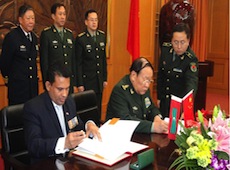Defence Minister Colonel (Retired) Mohamed Nazim signed a military aid agreement with Chinese National Defence Minister General Liang Guanglie during his official five-day visit that concluded yesterday (December 15).
Following official talks between the defence ministers, Chinese state-run Xinhua news agency reported Nazim as assuring Guanglie that the Maldives was “willing to cement relations between the two countries and their militaries.”
General Liang reportedly said China would “continue to develop friendly, cooperative and mutually beneficial relations with the Maldives under the principle of building a good-neighbourly relationship and non-interference in internal affairs”.
“China has always positively developed its military relations with the Maldives and hopes to enhance communication and cooperation, promote the construction of both militaries, and safeguard regional peace and stability,” he was quoted as saying by Xinhua.
According to a press release by the Ministry of Defence and National Security, Defence Minister Nazim held talks with his Chinese counterpart on December 11, which focused on Chinese military assistance to develop the Maldivian military.
The agreement to develop military ties and provide free Chinese aid to the Maldives National Defence Force (MNDF) was signed at the meeting, the press release stated.
Defence Minister Nazim also met the Vice Chairman of the Chinese Central Military Commission, Xu Qiliang, and discussed strengthening Sino-Maldives military ties.
 During his visit, Nazim visited the Chinese National Defence University to discuss securing education opportunities and toured the People’s Liberation Army (PLA) Naval Submarine Academy as well as the PLA Navy’s North Fleet.
During his visit, Nazim visited the Chinese National Defence University to discuss securing education opportunities and toured the People’s Liberation Army (PLA) Naval Submarine Academy as well as the PLA Navy’s North Fleet.
The Defence Minister met MNDF coastguard personnel training at the submarine academy, the press release noted.
Nazim’s official visit to China followed the government’s abrupt termination of a 25-year concession agreement with Indian infrastructure giant GMR to modernise and manage the Ibrahim Nasir International Airport (INIA).
The move fuelled speculation in the Indian media of a Chinese role in the government’s decision to void the agreement and evict the GMR-led consortium.
President Dr Mohamed Waheed Hassan Manik has however dismissed suggestions that China urged the Maldives to push out the Indian company.
“The only significant cooperation we have with China at this time is through development assistance… like building the museum, housing projects. I don’t think India should worry about it at all,” Waheed was quoted as saying by The Hindu.
Meanwhile, India’s The Economic Times reported yesterday that China’s strengthening of ties with the Maldives may be part of its larger plans of dominating strategically-important sea lanes in the Indian Ocean, “according to an assessment of the Indian intelligence agencies.”
“Beijing is reportedly wooing Male’ to pre-empt a US move to set up a new military base in the Maldives’ southernmost island of Gan,” The Economic Times reported.
The paper also took note of recent statements by former President Maumoon Abdul Gayoom suggesting that it was “natural for a country with such huge resources to come and help us.”
“China has been with us for 40 years,” Gayoom told Indian media last week.
In November 2011, China became the first non-SAARC nation to open an embassy in the Maldives.
AFP at the time reported Indian officials as expressing concern that it was “part of a Chinese policy to throw a ‘string of pearls’ – or a circle of influence – around India.”